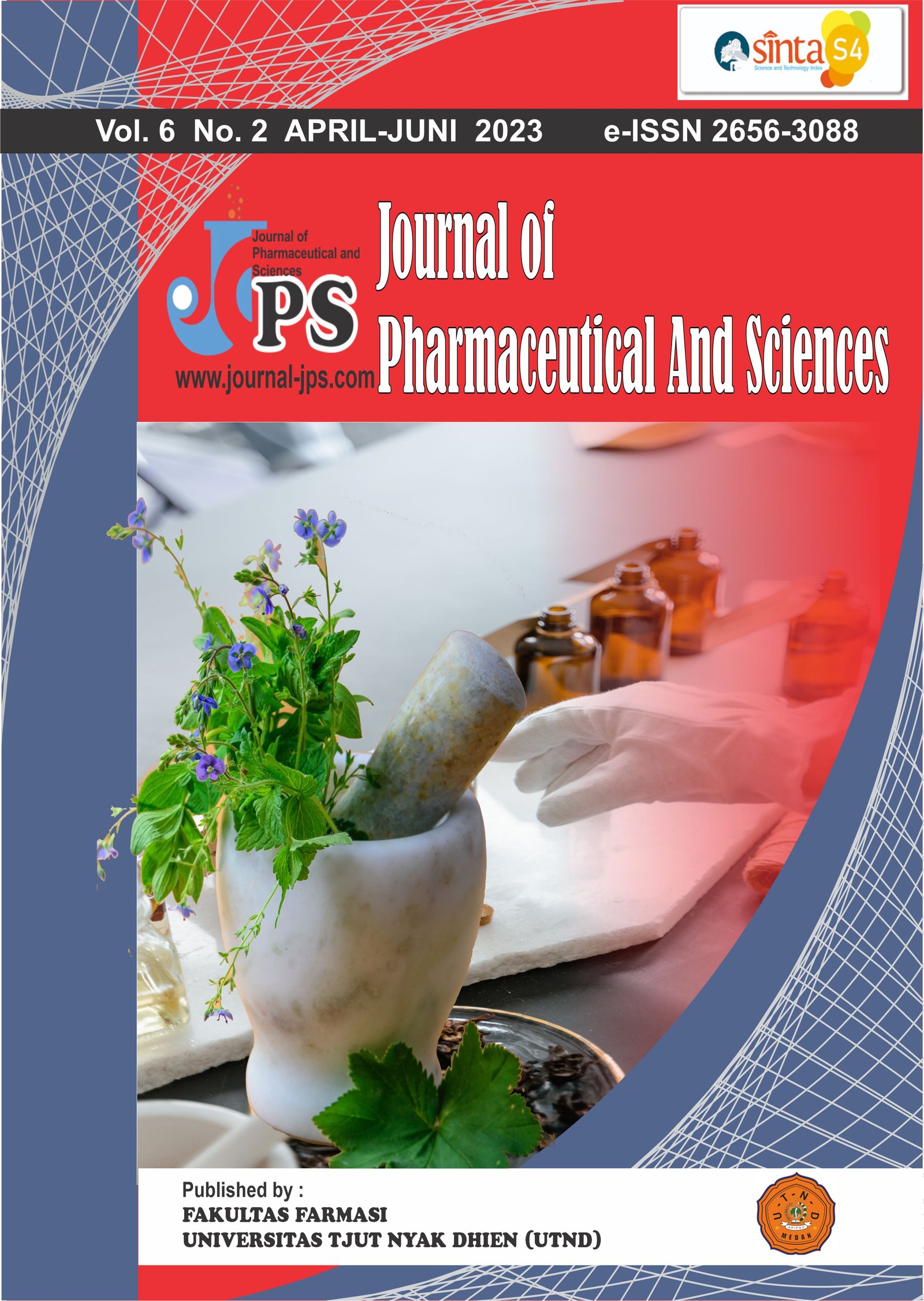Faktor Yang Mempengaruhi Penggunaan Obat Kategori Over The Counter Pada Mahasiswa UNSIKA
Isi Artikel Utama
Page: 344-350
Abstrak
Survei Badan Pusat Statistik tahun 2020 tentang pengobatan mandiri menunjukkan 88,28% masyarakat Jawa Barat melakukan swamedikasi salah satunya dengan obat kategori over the counter. Tingginya penggunaan obat kategori Over The Counter (OTC) ini meningkatkan kemungkinan terjadinya penyalahgunaan dalam hal penggunaan obat. Tujuan penelitian ini adalah identifikasi faktor-faktor apa saja yang mempengaruhi penggunaan obat kategori OTC dan membuktikan faktor-faktor yang mempengaruhi penggunaan obat kategori OTC pada mahasiswa Universitas Singaperbangsa Karawang (UNSIKA). Penelitian ini dilakukan pada bulan Januari sampai Maret 2022 menggunakan desain deskriptif analitik dengan pendekatan cross sectional. Instrumen yang digunakan berupa kuesioner. Teknik pengambilan sampel menggunakan metode accidental sampling dengan sampel terdiri dari 392 mahasiswa UNSIKA yang masuk ke dalam kriteria inklusi. Hasil analisis univariat mayoritas responden berpengetahuan baik, dipengaruhi efektivitas dan efisiensi produk dengan baik, memiliki ketersediaan informasi yang memadai, percaya terhadap produsen, dipengaruhi preferensi pemakaian, dan menggunakan obat dengan baik. Hasil analisis bivariat menggunakan metode chi square terdapat hubungan antara pengetahuan, kepercayaan terhadap produsen, dan preferensi pemakaian terhadap penggunaan obat kategori OTC dengan nilai signifikansi 0,001 (p <0,05) dan tidak terdapat hubungan antara efektivitas dan efisiensi produk serta ketersediaan informasi terhadap penggunaan obat kategori over the counter dengan nilai signifikansi berturut-turut sebesar 0,911 dan 0,973 (p > 0,05).
Unduhan
Rincian Artikel

Artikel ini berlisensiCreative Commons Attribution-NonCommercial-ShareAlike 4.0 International License.
Referensi
Ahmad, A. (2015). Hubungan Tingkat Pengetahuan Dengan Ketetapan Penggunaan Obat Analgetik pada Swamedikasi Nyeri di Masyarakat Kabupaten Demak. University Muhamadiyyah Surakarta.
Aswad, P. A., Kharisma, Y., Andriane, Y., Respati, T., & Nurhayati, E. (2019). Pengetahuan dan Perilaku Swamedikasi oleh Ibu-Ibu di Kelurahan Tamansari Kota Bandung. Jurnal Integrasi Kesehatan & Sains, 1(2), 107–113. https://doi.org/10.29313/jiks.v1i2.4462
Badan Pusat Statistik. (2014). Presentase Penduduk yang Mengobati Sendiri Selama Sebulan Terakhir Menurut Provinsi dan Jenis Obat yang Digunakan, 2000- 2014.
Blum, H. . (1981). Planning for Health: Generics for The Eighties. Human Sciences Press.
Chaturvedi, V. P., Mathur, A. G., & Anand, A. C. (2012). Rational drug use - As common as common sense? Medical Journal Armed Forces India, 68(3), 206–208. https://doi.org/10.1016/j.mjafi.2012.04.002
Dadhich, & Dixit. (2017). Consumer Selection and Buying Behaviour Towards Over the Counter (OTC) Medicine in Jaipur City. Apeejay-Journal of Management Sciences and Technology, 4(2), 73–82.
Farida, U., Marhenta, Y. B., Admaja, W., & Salsabila, A. (2021). Faktor-Faktor Yang Mempengaruhi Tingkat Pengetahuan Penggunaan Obat Bebas Dan Obat Bebas Terbatas Untuk Swamedikasi Pada Masyarakat Dusun Krajan Kedungjambe Singgahan Tuban. Journal of Herbal, Clinical and Pharmaceutical Science (HERCLIPS), 3(01), 1. https://doi.org/10.30587/herclips.v3i01.3072
Fitriany, M. S., Farouk, H. M. A. H., & Taqwa, R. (2016). Perilaku Masyarakat dalam Pengelolaan Kesehatan Lingkungan (Studi di Desa Segiguk sebagai Salah Satu Desa Penyangga Kawasan Hutan Suaka Margasatwa Gunung Raya Ogan Komering Ulu Selatan). Jurnal Penelitian Sains, 18(1), 41–44.
Fuaddah, A. T. (2015). Description Of Self-Medication Behavior In Community Of Subdistrict Purbalingga, District Purbalingga Ardika Tri Fuaddah Public Health Faculty Diponegoro University. Jurnal Kesehatan Masyarakat, 3, 610–619.
Hidayati, A., Dania, H., Puspitasari, M. D., Farmasi, F., Ahmad, U., & Yogyakarta, D. (2017). OBAT BEBAS TERBATAS UNTUK SWAMEDIKASI PADA MASYARAKAT RW 8 MOROBANGUN JOGOTIRTO BERBAH. 3(2), 139–149.
Indonesia, P. M. K. R. Standar Pelayanan Kefarmasian di Apotek. , (2016). Indonesia.
Kohli, E., & Buller, A. (2013). Factors influencing consumer purchasing patterns of generic versus brand name over-the-counter drugs. Southern Medical Journal, 106(2), 155–160. https://doi.org/10.1097/SMJ.0b013e3182804c58
Lukovic, J. A., Miletic, V., Pekmezovic, T., Trajkovic, G., Ratkovic, N., Aleksic, D., & Grgurevic, A. (2014). Self-medication practices and risk factors for self-medication among medical students in Belgrade, Serbia. PLoS ONE, 9(12), 1–14. https://doi.org/10.1371/journal.pone.0114644
Muliyawan, & Suriana. (2013). A-Z tentang Kosmetik. Jakarta: PT Elex Media Komputindo Kelompok Gramedia.
Notoatmodjo, S. (2014). Ilmu Perilaku Kesehatan. Jakarta: Rineka Cipta.
Oktaviana, E., Hidayati, I. R., & Pristianty, L. (2019). Pengaruh Pengetahuan terhadap Penggunaan Obat Parasetamol yang Rasional dalam Swamedikasi (Studi pada Ibu Rumah Tangga di Desa Sumberpoh Kecamatan Maron Kabupaten Probolinggo). Jurnal Farmasi Dan Ilmu Kefarmasian Indonesia, 4(2), 44. https://doi.org/10.20473/jfiki.v4i22017.44-50
Prasanti, D. (2017). Komunikasi Terapeutik Tenaga Medis dalam Pemberian Informasi tentang Obat Tradisional bagi Masyarakat. Mediator: Jurnal Komunikasi, 10(1), 53–64. https://doi.org/10.29313/mediator.v10i1.2624
Pratiwi, P. N., Pristianty, L., Noorrizka, G., & Impian, A. (2014). Pengaruh Pengetahuan Terhadap Perilaku Swamedikasi Obat Anti-Inflamasi Non-Steroid Oral Pada Etnis Thionghoa Di Surabaya. Jurnal Farmasi Komunitas, 1(2), 36–40.
Putri, D. R. (2017). Pengaruh Kualitas Pelayanan Kefarmasian terhadap Kepuasan, Kepercayaan, & Loyalitas Konsumen Apotek. Indonesian Journal for Health Sciences, 1(1), 23. https://doi.org/10.24269/ijhs.v1i1.381
Rafiqa, I. (2012). Analisis Faktor-Faktor yang Mempengaruhi Konsumen dalam Proses Pengambilan Keputusan Pembelian Obat Bebas (Studi Kasus Konsumen di Jakarta). Universitas Indonesia.
Rarung, L. (2016). Tanggungjawab Hukum Terhadap Pelaku Pembuat Obat-Obatan Tradisional Ditinjau Dari Undang- Undang Nomor 36 Tahun 2009 Tentang Kesehatan. Laboratorium Penelitian Dan Pengembangan FARMAKA TROPIS Fakultas Farmasi Universitas Mualawarman, Samarinda, Kalimantan Timur, VI(April), 5–24.
Riza, F. S., Genesio, I., Nugroho, N., & Lioe, N. P. (2019). Faktor Keputusan Konsumen Dalam Memilih Obat Bebas Di Provinsi Dki Jakarta. Indonesian Business Review, 2(1), 43–64. https://doi.org/10.21632/ibr.2.1.43-64
Saha, S., & Hossain, M. T. (2017). Evaluation of medicines dispensing pattern of private pharmacies in Rajshahi, Bangladesh. BMC Health Services Research, 17(1), 1–8. https://doi.org/10.1186/s12913-017-2072-z
Wea, M. O. (2019). Studi Komparatif Faktor yang Mempengaruhi Preferensi Masyarakat antara Memilih Obat Tradisional dan Obat Sintetik di Apotek Kimia Farma 135 Hatta Kupang. Universitas Citra Bangsa Kupang.
World Drug Report. (2012). Recent Statistic and Trend Analysis of Illicit Drug.





